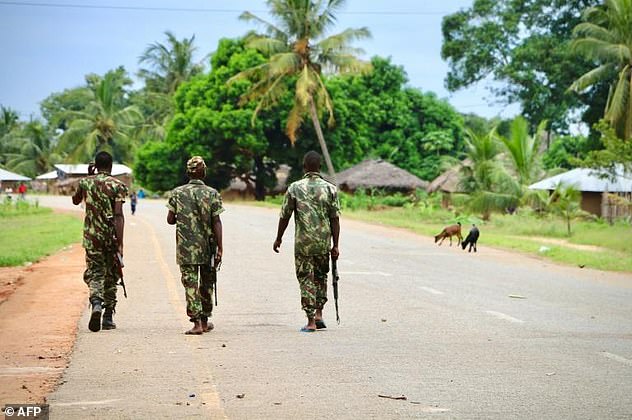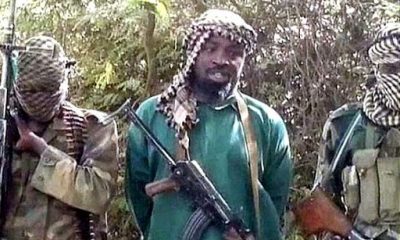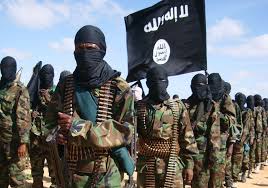News
Children As Young As 11 Beheaded In Front Of Their Mothers By ISIS-Linked Militants

- Mother said son, 12, was beheaded close to where she hid with her children
- Another said she was unable to bury her son because her family had to flee
- Jihadists have been fighting insurgency in Cabo Delgado province since 2017
Children as young as 11 have been beheaded by ISIS-linked militants who have killed more than 2,500 people over the last three years in Mozambique.
One mother told Save the Children that her eldest son, 12, had his head cut off close to where she was hiding with her three other children when their village was raided.
Another mother described her heartache at leaving her murdered 11-year-old son in their village without a burial because her family were forced to flee.
Nearly 580,000 people left their homes last year as violence intensified across the gas-rich Cabo Delgado province where a group calling itself Islamic State Central Africa Province have been waging a brutal insurgency since 2017.
Some have moved in with host families, some are living in temporary shelters, while others have resettled in newly-created safe villages.
Around half of the 2,614 people who have died in the conflict are civilians.
Amnesty International earlier this month warned that war crimes were being perpetrated on all sides of the conflict, including by the jihadists, government forces and mercenaries.
Government soldiers have been accused of raping and beating women near their one of their bases and summarily executing suspected terrorists.
The jihadists were also accused of heinous violence with machetes, including dozens of beheadings and the desecration of corpses.
The 28-year-old mother who lost her 12-year-old son told Save the Children of the night her village was razed by the Islamists.
‘That night our village was attacked, and houses were burned,’ she said.
READ ALSO: Police Rescue Four Girls In Anambra Baby Factory
‘When it all started, I was at home with my four children. We tried to escape to the woods, but they took my eldest son and beheaded him. We couldn’t do anything because we would be killed too.’
The 29-year-old woman who lost her 11-year-old said: ‘After my son was killed, we understood that it was no longer safe to stay in my village. We fled to my father’s house in another village, but a few days later the attacks started there too.
‘Me, my father and the children spent five days eating green bananas and drinking banana tree water until we got transport that brought us here.’
Chance Briggs, Save the Children’s Country director in Mozambique, said his staff had been ‘sickened to the core’ by the reports from mothers in displacement camps.
‘While the world was focused on COVID-19, the Cabo Delgado crisis ballooned but has been grossly overlooked. Humanitarian aid is desperately required, but not enough donors have prioritised assistance for those who have lost everything, even their children,’ Mr Briggs said.
‘Critically, all parties to this conflict must ensure that children are never targets. They must respect international humanitarian and human rights laws and take all necessary actions to minimise incidental civilian harm, including ending indiscriminate and disproportionate attacks against children.’
Jihadist assaults rocketed last year, triggering a humanitarian crisis akin to the end of Mozambique’s 1977-1992 civil war.
More than half of the roughly 800 attacks documented by US conflict tracker ACLED since 2017 took place last year alone, defying government efforts to boost its military presence in the area.
The Cabo Delgado incursions have played out around a multi-billion-pound liquid natural gas (LNG) exploration project off the Afungi peninsula, raising concern among project developers.
Jihadists remain in control of Mocimboa da Praia, a port used as a supply point for gas exploration before it was seized in August.
French oil giant Total evacuated workers in December after clashes broke out at the doorstep of its LNG facility.
The insecurity has left aid agencies unable to visit a huge swathe of the coastal province, while the number of people forced to flee their homes has swelled from 18,000 at the start of 2020 to over half a million by the end, Lola Castro, World Food Programme (WFP) regional director said.
Some households in the provincial capital Pemba are hosting several other families.
One had opened its home to 66 other people who all slept in one room and shared one latrine.
‘The situation in Cabo Delgado is appalling,’ Valentin Tapsoba, regional director for the United Nations refugee agency, said last month.
Daily Mail UK
Send Us A Press Statement Advertise With Us Contact Us
And For More Nigerian News Visit GWG.NG








